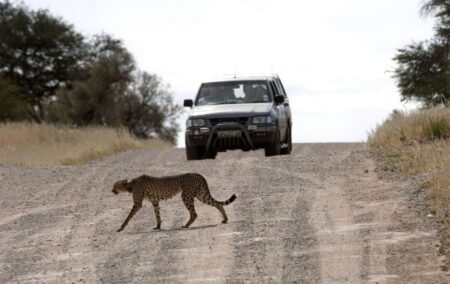A trip through spectacular vistas became a trip through an endless rubbish dump.
I’ve been slacking these past two weeks. Truth is, I was in the Kgalagadi Transfrontier Park on a ten-day trip and broadband connectivity isn’t a major feature in that part of the world. Besides, I hadn’t taken my laptop on holiday with me so my editor very kindly allowed me a couple of weeks’ leave while more important things were happening in the RSA.
Travelling from Cape Town through the Northern Cape en route to what used to be known as the Kalahari, one is struck by the incredible beauty of our country and the friendliness of its people. Our first stop north was Calvinia and we had driven through breathtakingly beautiful farmland before we arrived there. My obvious thought as an election approached was what would happen to this land if it was expropriated (with or without compensation) and parcelled out to loyal ANC cadres. What would happen to the farm buildings, the farm machinery and the entire infrastructure? I tried, unsuccessfully, to believe that the status quo would be maintained and that the trees would not be chopped down for firewood, the buildings not cannibalized to build shacks and the machinery left to rust in the fields. Call this Afro-pessimism if you will, but I prefer to think of it as Afro-realism. Given what has happened to most of our state-owned enterprises you must forgive this white boy for expecting the worst. But who knows, I could be horribly wrong and it could be that the ANC and its supporters will revolutionise modern farming and leave me red-faced.
As we travelled north towards Upington, the towns became noticeably poorer in this drought-stricken part of the world as the landscape became ever more dramatic. We stopped for a light lunch at a place called Kenhardt (population about 4 500). The Afrikaans-speaking owners were welcoming and keen for some passing trade, but both hold down several jobs in addition to attempting to farm sheep in the area just to make a living. The drought has virtually bankrupted them and most of the villagers sit around the small village with absolutely nothing to do hoping for better times. We were told that drugs have become a big problem among the youth. Kenhardt isn’t exactly a tourist mecca, although it does have a 500-year-old camelthorn tree under which a special magistrate called Maximillian Jackson set up camp and established the town in 1868. Its only other claim to fame is that Sir Malcolm Campbell attempted a world land speed record in 1929 on Verneukpan in Bluebird 1. Hardly a great reason to stop off at Kenhardt, although the home-made ginger beer is worth the trip.
What did strike me as we passed through many of these Northern Cape towns was the incredible amount of litter lying uncollected by the roadside. Driving out of larger towns like Kakamas and Keimoes towards sundown, the visitor is treated to a twinkling, jewel-encrusted landscape of green, brown and gold catching the early evening light. Even the approach road to Augrabies Falls national park had a twinkling patch of evening jewels. On closer examination the ‘jewels’ turn out to be hundreds of smashed beer and wine bottles interspersed with discarded fast-food containers and crushed plastic bottles. Only a few metres away people seem to be living quite happily next to this pile of ornamental litter. It’s a national disgrace and our tour guide told me he is embarrassed to bring foreign visitors to this part of the world because he can’t even begin to explain why people who have nothing better to do all day have so little pride in their surroundings that they cannot be bothered to clean the place up. What on earth do so-called community leaders do with their time? Has it not occurred to them that making their towns a desirable destination for tourists would boost the local economy and create employment? Or are they all just waiting for the service delivery that never seems to arrive in an ANC-controlled province.
South Africa is blessed with everything a foreign tourist could ever wish for. Stunning and highly varied and dramatic landscapes, breathtakingly clear night skies, wonderful people, great roads, wildlife, a favourable currency and plenty of comfortable places to stay. We should be building our tourism industry in this country not turning destinations into gigantic rubbish tips.
David Bullard is a columnist, author and celebrity public speaker known for his controversial satire.
The views of the writer are not necessarily the views of the IRR.
If you like what you have just read, become a Friend of the IRR if you aren’t already one by SMSing your name to 32823 or clicking here. Each SMS costs R1.’ Terms & Conditions Apply.

